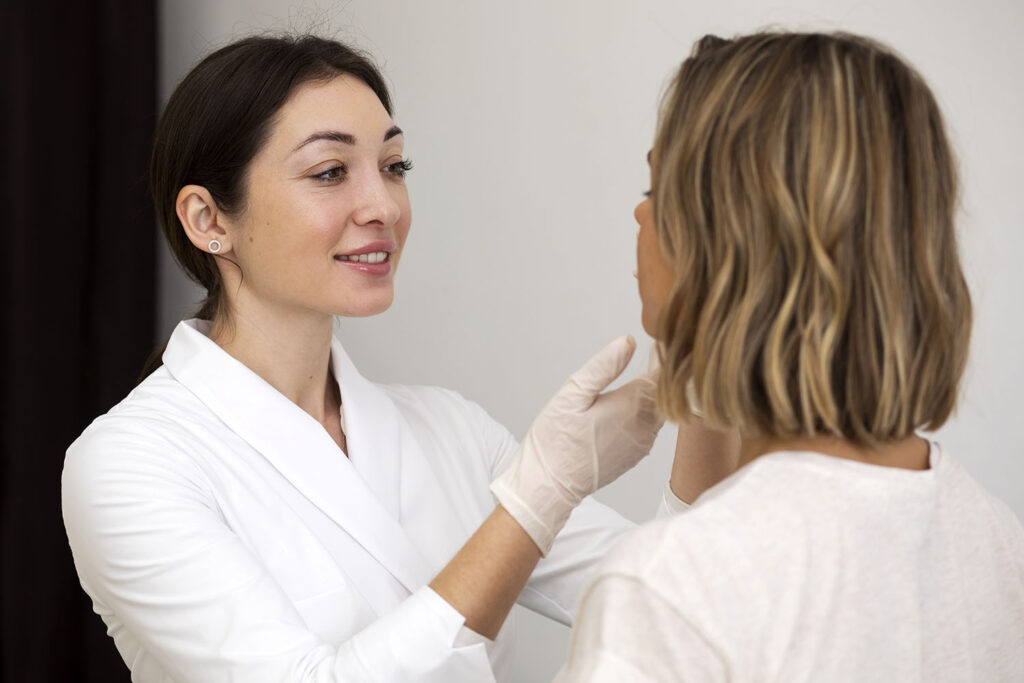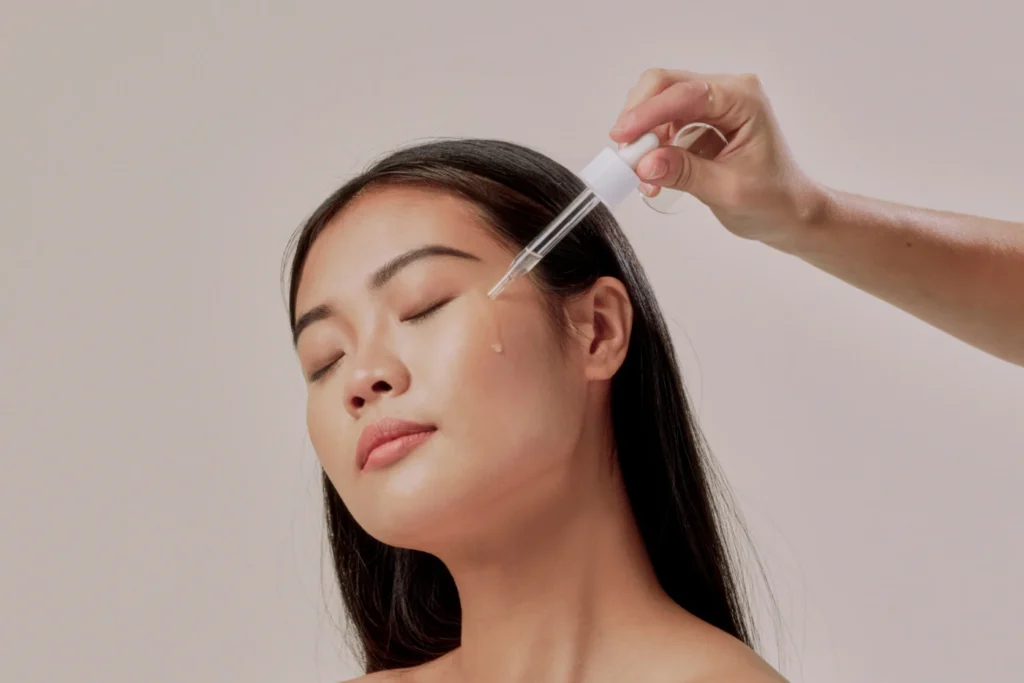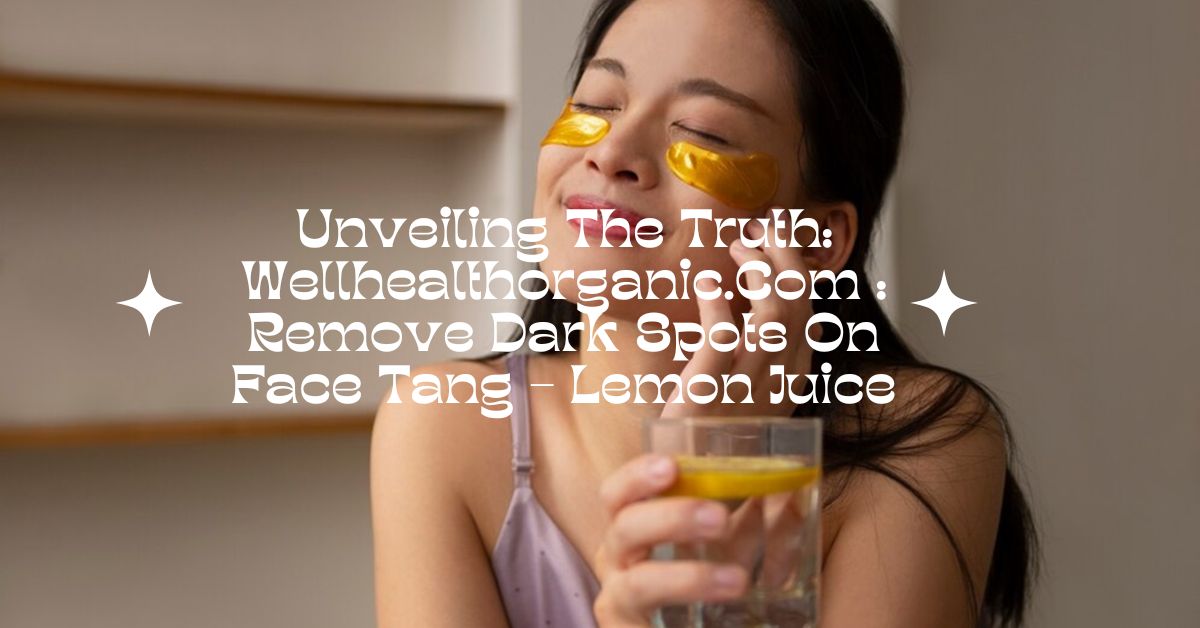Unveiling The Truth: Wellhealthorganic.Com : Remove Dark Spots On Face Tang – Lemon Juice
Dark spots, also known as hyperpigmentation, can be a frustrating blemish on your otherwise radiant complexion. These patches of darker skin can be caused by various factors, including sun exposure, hormonal changes, and acne scars. While numerous products claim to tackle this issue, many turn to natural remedies for a gentler approach.
Wellhealthorganic.Com : Remove Dark Spots On Face Tang – Lemon Juice treatment as a solution for dark spots. But before diving headfirst into a citrusy adventure, let’s delve into the science behind lemon juice and its potential to banish those pesky spots.
This article will explore the claims made by Wellhealthorganic.com, analyze the science behind lemon juice for dark spots, and offer alternative solutions and crucial considerations.
The Power of Citrus: Can Lemon Juice Lighten Dark Spots?
Lemon juice boasts a refreshing acidity, a tangy flavor, and a surprising number of uses beyond lemonade. It’s a natural source of vitamin C, citric acid, and other antioxidants, all of which play a role in skin health. Here’s a breakdown of how these components might influence dark spots:
Vitamin C: This potent antioxidant helps stimulate collagen production, which plumps the skin and reduces the appearance of wrinkles. Additionally, vitamin C can inhibit the enzyme tyrosinase, a key player in melanin production. Melanin is the pigment responsible for skin color, and excess melanin production can lead to dark spots.
Citric Acid: This acidic component acts as a mild exfoliant, helping to remove dead skin cells from the surface. This can promote cell turnover, revealing a brighter, more even-toned complexion underneath.
Antioxidants: These compounds fight free radicals, which damage skin cells and contribute to hyperpigmentation.
While there’s some scientific backing for the individual components in lemon juice, the evidence for its effectiveness in treating dark spots specifically is limited.
Studies haven’t definitively proven its impact on hyperpigmentation, and most research focuses on its potential benefits for overall skin health.
Wellhealthorganic.com’s Lemon Juice Treatment: A Closer Look

Wellhealthorganic.com’s website promotes a lemon juice treatment for dark spots, offering a step-by-step application guide and highlighting positive customer testimonials. However, some key points deserve further consideration:
Limited Product Information: The website focuses on the general benefits of lemon juice rather than specifics about its product. It’s unclear if their lemon juice is diluted or contains additional ingredients.
Potential for Irritation: Lemon juice is acidic, which can be harsh on sensitive skin. Applying it directly to the face may cause redness, dryness, or burning.
Sun Sensitivity: As mentioned earlier, citric acid increases sun sensitivity. While Wellhealthorganic.com emphasizes daily sunscreen use, this is crucial to prevent further darkening of existing spots.
Read: The Early Life, Husband, Children, Career, Net Worth, And Legacy Of Yun Chi Chung
Beyond Lemon Juice: Alternative Solutions for Dark Spots
If you’re looking to fade dark spots, here are some alternative options to consider:
Vitamin C Serums: These topical serums contain concentrated vitamin C, which has a more significant impact on reducing hyperpigmentation compared to lemon juice’s natural levels. Look for serums formulated with L-ascorbic acid, the most potent form of vitamin C for skin lightening.
Kojic Acid: This natural ingredient derived from mushrooms can help lighten dark spots by inhibiting tyrosinase activity. It’s often found in over-the-counter skincare products and can be effective when used consistently.
Hydroquinone: This prescription medication is a powerful bleaching agent that significantly lightens dark spots. However, it can also irritate the skin and requires a doctor’s consultation.
Chemical Peels: These in-office treatments use controlled amounts of acid to remove the outer layer of skin, revealing a brighter, smoother complexion. Chemical peels can be customized based on the severity of dark spots and your skin type.
Laser Therapy: This advanced treatment uses targeted laser beams to break down melanin in the affected areas. Laser therapy is a highly effective option for stubborn dark spots, but it’s also the most expensive and requires a dermatologist’s expertise.
A Crucial Consideration: Consult Your Dermatologist
Consulting a dermatologist is crucial before embarking on any treatment, particularly with natural remedies like lemon juice. They can assess your specific skin type, and the cause of your dark spots, and recommend the most appropriate treatment plan.

They can also guide you on patch-testing new products like vitamin C serums to ensure your skin doesn’t react negatively.
Additionally, a dermatologist can address any underlying medical conditions contributing to hyperpigmentation, providing a more holistic approach to achieving a clear, radiant complexion.
Read: Berry0314 Shower: Elevate Your Daily Ritual
Sun Protection: The Best Friend for Your Skin
The sun, while a source of warmth and vitamin D, is also a primary culprit behind dark spots. Ultraviolet (UV) rays trigger an increase in melanin production, the pigment responsible for skin color. Overexposure leads to hyperpigmentation, manifesting as those pesky dark spots.
Shield Yourself: Apply a broad-spectrum sunscreen with an SPF of 30 or higher daily, even on cloudy days. Reapply every two hours, especially after you’ve gone swimming or sweating.
Seek Shade: Limit sun exposure during peak hours, typically between 10 AM and 4 PM.
Protective Clothing: Wear hats, sunglasses, and long-sleeved clothing to shield your skin from the sun’s harmful rays.
Patience is a Virtue: The Journey to Clear Skin

Improving skin condition takes time and consistency. While some treatments might show initial results, significant changes usually require several weeks or even months. Try not to lose hope if you don’t get results right away.
Lifestyle Factors and Skin Health
Your overall health and lifestyle significantly impact your skin’s appearance.
Hydration: Drinking plenty of water keeps your skin hydrated, promoting a healthy glow and aiding in cell turnover.
Diet: A balanced diet rich in antioxidants, vitamins, and minerals supports skin health. Incorporate fruits, vegetables, and whole grains into your meals.
Stress Management: Chronic stress can exacerbate skin conditions. Practice relaxation techniques like meditation, yoga, or deep breathing to manage stress levels.
Sleep: Adequate sleep is vital for skin repair and regeneration. Aim for 7-9 hours of quality sleep each night.
When to Seek Professional Help
If you’ve tried various treatments without satisfactory results, or if you’re concerned about the severity or underlying cause of your dark spots, consult a dermatologist. They can provide accurate diagnosis, recommend suitable treatments, and address any underlying skin conditions.
Common Skin Conditions Linked to Hyperpigmentation:
Melasma: Hormonal fluctuations often trigger this condition, causing brown patches on the face.
Post-inflammatory Hyperpigmentation (PIH): Acne, eczema, or other skin injuries can lead to dark spots as the skin heals.
Sun Damage: Excessive sun exposure is a primary cause of dark spots and premature aging.
Read: Miguel Gallego Arambula: Age, Biography, Career, Parents, Siblings, Details, Relationship
FAQs:
1. Is lemon juice effective in removing dark spots?
While lemon juice contains vitamin C and citric acid, which have some skin-benefiting properties, there’s limited scientific evidence to support its effectiveness in specifically targeting dark spots. Individual results may vary, and it’s essential to consider potential side effects like skin irritation and increased sun sensitivity.
2. How should I use lemon juice for dark spots?
If you decide to try lemon juice, it’s crucial to dilute it with water to minimize skin irritation. Apply the diluted solution to the affected areas for a short duration, then rinse thoroughly. Always perform a patch test before applying it to your face.
3. Are there any side effects of using lemon juice on the face?
Yes, lemon juice can be irritating to the skin, especially if used undiluted or for extended periods. It can cause redness, dryness, and increased sensitivity to sunlight. If you experience any adverse reactions, discontinue use immediately.
4. When should I consult a dermatologist about dark spots?
If you have persistent or worsening dark spots, or if you experience any skin irritation or discomfort, it’s advisable to consult a dermatologist. They can provide a proper diagnosis, recommend suitable treatments, and address any underlying skin conditions.
Conclusion:
The journey to clear, even-toned skin is a personalized one. While lemon juice may offer some benefits, it’s essential to consider its limitations and potential side effects. Combining natural remedies with sun protection, a healthy lifestyle, and, when necessary, professional dermatological care can help you achieve your skin goals.
Read more:
- The Rise Of Jimmy Sexton Net Worth: From Humble Beginnings To A Net Worth Of $31 Million
- Ramone Malik Hill’s Personal Life, Biography, Age, Family, And Wiki Have All Been Provided
- Molly Leigh Burton: All About Daughter Of Don Burton And Dolores O’riordan
- Cara Webb Hanson: A Story Of Resilience And Achievement






